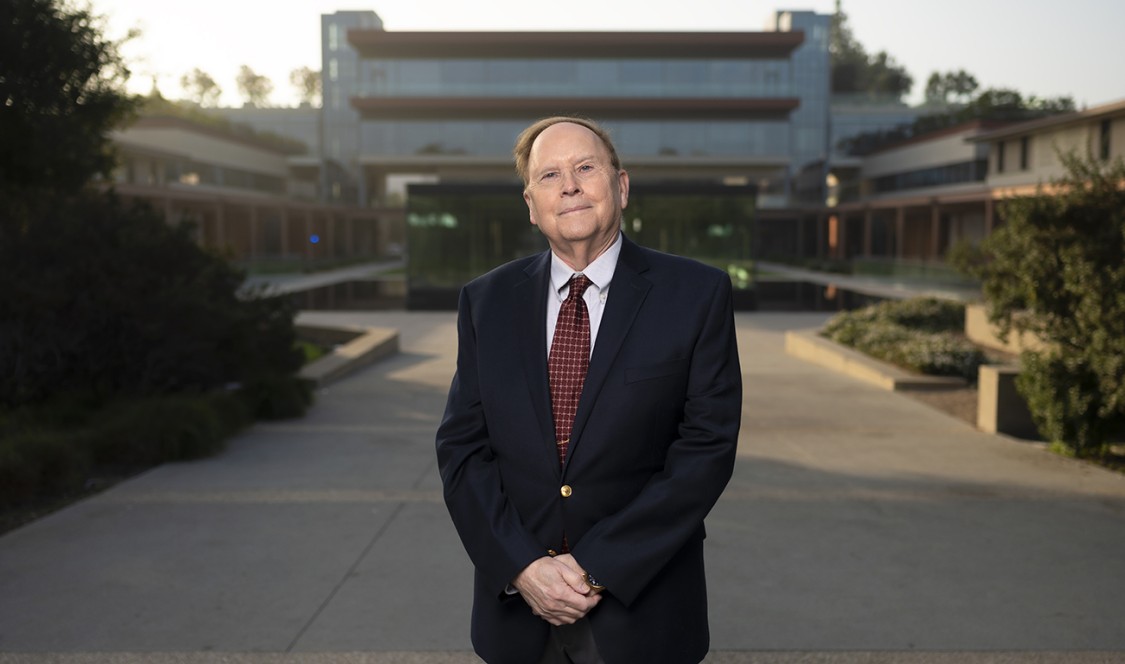As a recognized expert on social inequality, diversity policies, political correctness, and generational politics you can find Prof. Frederick Lynch’s op-eds in the New York Times, Newsweek, and USA Today. While he’s appreciated the professional and public attention, as he reflects on 30 years at CMC, what brings him the most satisfaction is educating his students on how to think critically about “relevant issues.”
Throughout his teaching, Lynch, an associate professor of government, encourages students to examine our social systems and structures. This fall, he taught “Organization of Health Care and Public Policy,” a topic that seems perpetually relevant, and also constantly evolving.
For example, at the start of the semester, given the effects of COVID-19, Lynch opened the class—which he has taught for more than 15 years—with “an examination of epidemics and pandemics” and an update on how “the pandemic is changing society and healthcare systems.”
With a graduate school-level syllabus and rigorous supplemental reading list, among the themes Lynch’s students explore are philosophical such as, “individual rights versus community health,” he said. His overall goal, however, is to compel his students “to ask intelligent questions about inequality in order to understand what’s really going on.”
Former student Scott Sonneborn ’17 remembers Lynch incorporating “current events and discussions” into his coursework. “Everything we discussed was three to four years ahead of the curve,” said Sonneborn now a tech entrepreneur and co-founder of Tydo. “He’d find articles that spoke to the potential consequences of actions and decisions from voices who were not amplified by mainstream media. Prof. Lynch cut through the noise.”
Another of Lynch’s former students, Raul Alcantar ’04, recalls Lynch encouraging “broad participation and structured debates.” Alcantar, who credits Lynch with encouraging and supporting his goal of attending Harvard Law School, added, “He would assign us which side we were to argue and we’d have these vigorous and very rich debates.”
Now General Counsel at a binational airport terminal, Alcantar said that Lynch “taught us to look at issues from multiple angles. Being in his class prepared me for my work as a lawyer.”
Profiled in Forbes Magazine, and The Chicago Tribune, Lynch is the author of three books—currently at work on his fourth—as well as numerous scholarly articles and other national publications. He brings the depth of his own research, fieldwork, and experience to the classroom.
Inequality, social change, and public policy are all topics that have held Lynch’s interest since his undergraduate years at the University of Michigan, Ann Arbor, where he earned a BA in Sociology. From there he furthered his study of sociology at the University of Missouri, Columbia, where he earned his MA, culminating with a PhD from UC Riverside.
Lynch credits his time at the University of Michigan with sparking his love for a “liberal arts undergraduate education.” His appreciation has deepened after three decades at CMC, a four-year residential liberal arts college. “I advise my students to take advantage of this experience. Drink deeply of it, as it’s the only time you’ll have four years to just sit under a tree and read a book,” he said.
In addition, Lynch advises—and even sometimes requires—his students to attend lectures at the Athenaeum, which he calls the “crown jewel of CMC,” extolling its virtues as a bastion for critical thinking.
“Go to the Ath and go often,” he tells his students, further encouraging them, “Go to hear the speakers with whom you think you’re going to disagree.”
Given that Lynch explores controversial topics in his research and in the classroom, he prizes civil discourse, and was proud to learn that CMC was recognized as the No. 1 college in the nation for free expression, by the nonpartisan Foundation for Individual Rights in Education (FIRE). “The College deserves that recognition,” he said.
Looking back on his 30 years at CMC, Lynch praises his colleagues and the members of the administration for their ability to adapt to the times while retaining CMC’s high academic standards. With the development of majors like data science and CMC’s announcement of the new Robert Day Sciences Center, Lynch said he’s pleased to see that as, “The world is changing, CMC is changing.”
While CMC adapts to meet the needs of the current moment, Lynch said what remains true is that “students make this place so dynamic. It’s a true joy to teach here.”

